Key takeaways
- Town hall meetings in Louisiana provide an essential platform for citizens to engage with local government, voice concerns, and foster community connection.
- Civic engagement turns frustrations into constructive dialogue, empowering residents to influence decisions affecting their communities.
- Preparation for participation includes reviewing the agenda and researching issues, which boosts confidence and promotes meaningful engagement.
- Sharing personal experiences during meetings enhances emotional engagement and fosters stronger connections among participants, making discussions more impactful.
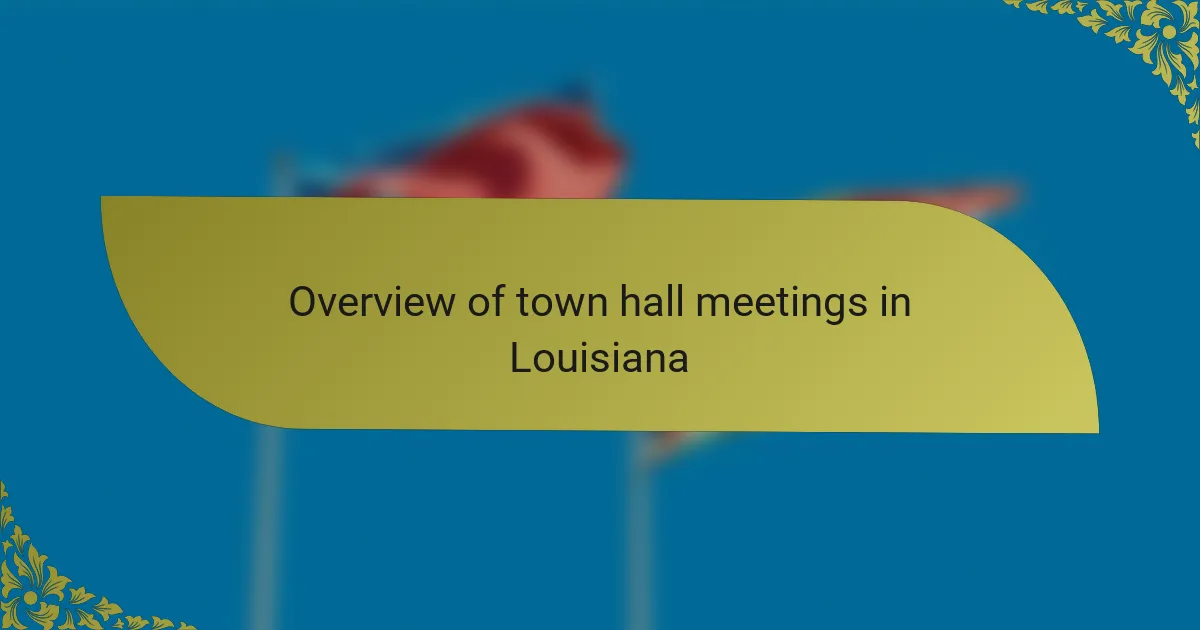
Overview of town hall meetings in Louisiana
Town hall meetings in Louisiana serve as a vital platform for citizens to engage with their local government. I’ve found these gatherings to be not just informative but also incredibly empowering. The sense of community is palpable; it’s a space where residents share concerns and offer solutions, creating a collective voice that can influence local policies.
From my experience, emotions and fervor often fill the room as people share their stories and ask tough questions. Each meeting I attended felt like a pulse check on our community, highlighting the issues we all care about deeply. Here are a few key elements that make these meetings essential:
- Open dialogue between citizens and government officials.
- Opportunities for residents to voice opinions on local issues.
- Availability of resources and information about upcoming projects.
- Community bonding and networking opportunities among residents.
- A platform for holding local leaders accountable for their actions.
These aspects truly make town hall meetings a cornerstone of Louisiana’s democratic process.
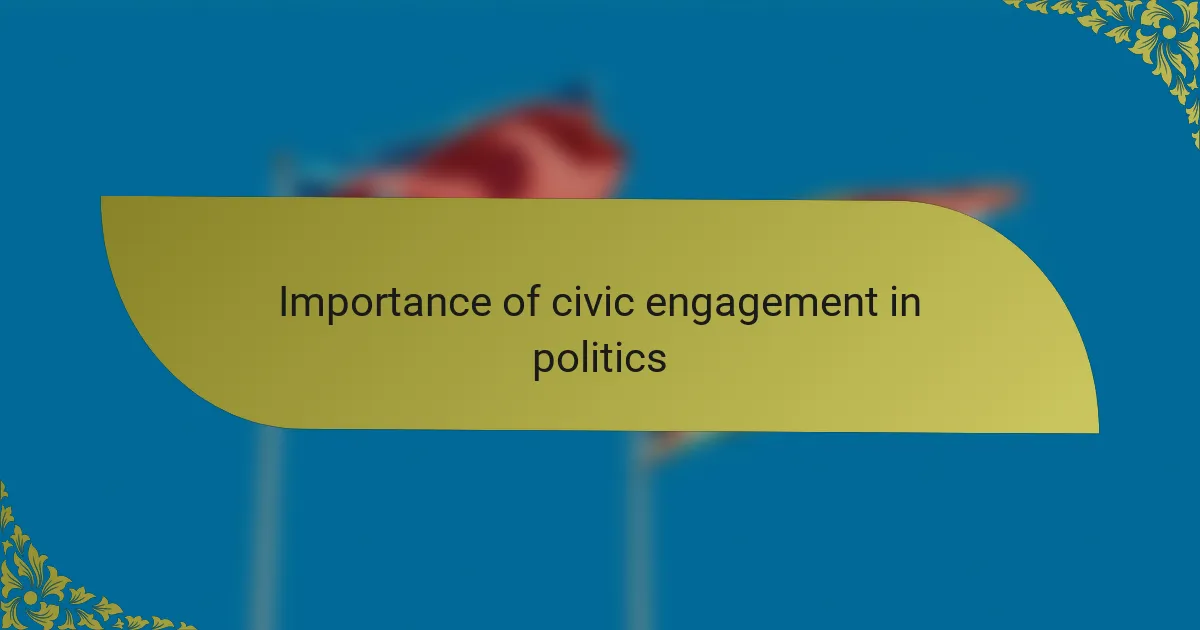
Importance of civic engagement in politics
Civic engagement is the heartbeat of democracy. When citizens actively participate in politics, they transform their frustrations into constructive dialogue. I remember attending a town hall meeting where a single question sparked a lively discussion about road safety in our neighborhood, highlighting just how impactful one voice can be.
Being involved in local politics isn’t just about showing up; it’s about being heard. I’ve witnessed people who felt invisible suddenly find their voice and realize they can shape the future of their community. Who knew that by simply sharing personal experiences, they could influence decision-makers and inspire change? It’s moments like these that remind me of the power we wield when we engage together.
Moreover, civic engagement fosters a sense of responsibility and ownership among residents. After attending several meetings, I’ve felt a deeper connection to my community. When we participate, we’re not just spectators; we’re stakeholders invested in the well-being of our neighbors and the direction our towns are headed. Isn’t that a sentiment worth exploring further?
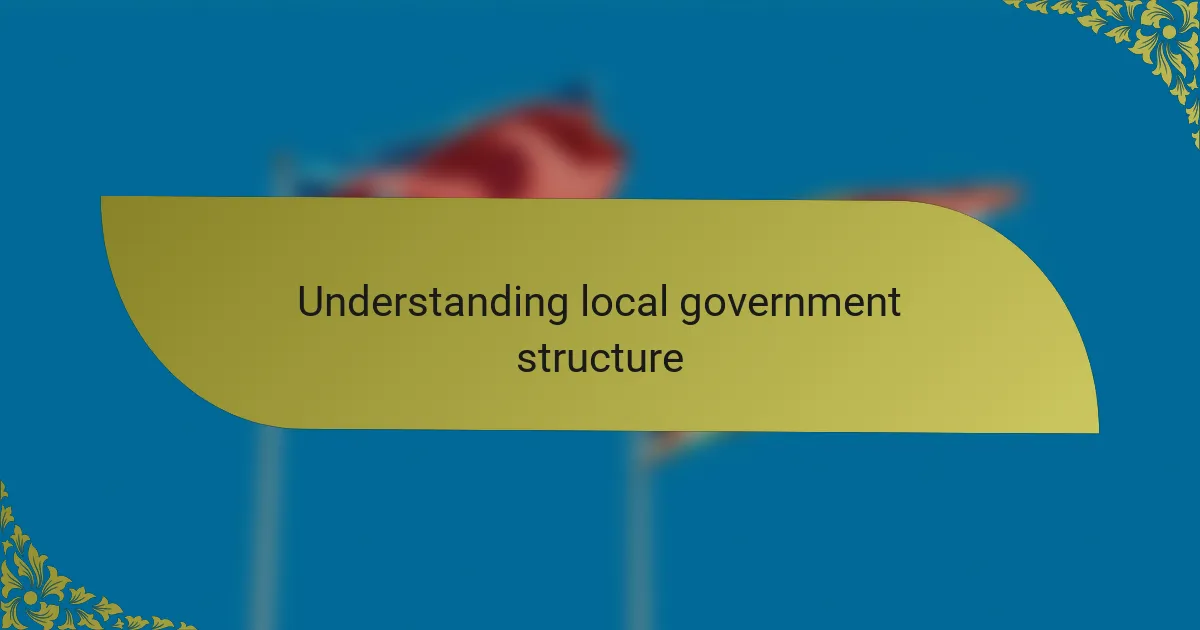
Understanding local government structure
Local government structures can often feel complex, but understanding them is key to meaningful participation. In my experience, attending town hall meetings has highlighted the vital roles that mayors, city councils, and other officials play in shaping community decisions. I remember the first time I spoke up at a meeting; it was daunting, yet empowering to see how local leaders truly value citizen input.
Engaging with your local government means knowing who makes what decisions. For instance, while the mayor often tackles executive functions, the city council is responsible for legislation. This divide in responsibilities can influence how effectively community issues are addressed, as I’ve learned through observation and dialogue with my neighbors.
| Local Government Role | Responsibilities |
|---|---|
| Mayor | Executes laws, proposes budgets, and manages city departments |
| City Council | Creates ordinances, approves budgets, and represents constituents |
| Local Departments | Handle specific services like public works, parks, and recreation |
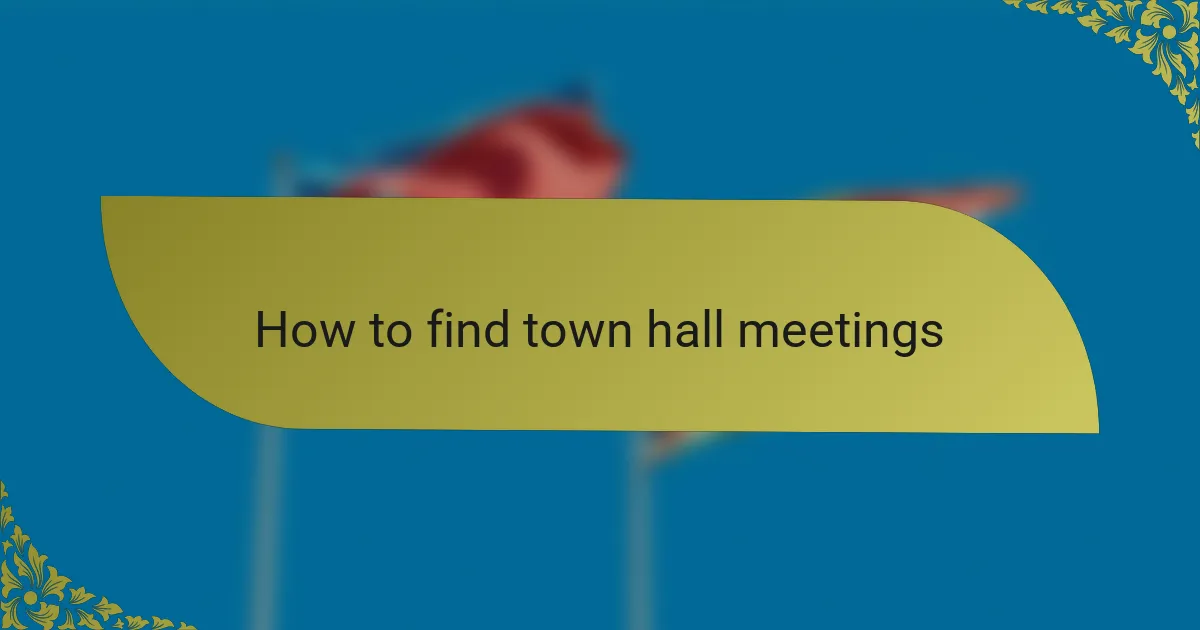
How to find town hall meetings
Finding town hall meetings can be quite straightforward if you know where to look. Personally, I’ve found that local government websites are a goldmine for this information. They often display schedules, agendas, and even past meeting minutes, making it easy to stay informed about the issues that matter to me.
Additionally, I recommend checking out community boards or social media groups. Engaging with your neighborhood can provide insights and connections that you might not find elsewhere. Here are some specific places to search for upcoming meetings:
- Local Government Website: Look for sections labeled ‘Meetings’ or ‘Calendar.’
- City or Parish Facebook Page: Many officials post updates here.
- Neighborhood Associations: These groups often organize or share information about town hall events.
- Local Newspapers: They typically cover community events and announcements.
- Word of Mouth: Talking to neighbors or local activists can reveal meetings you might miss online.
Having participated in a few of these meetings, I can’t stress enough how rewarding it feels to voice my opinions and connect with my community.
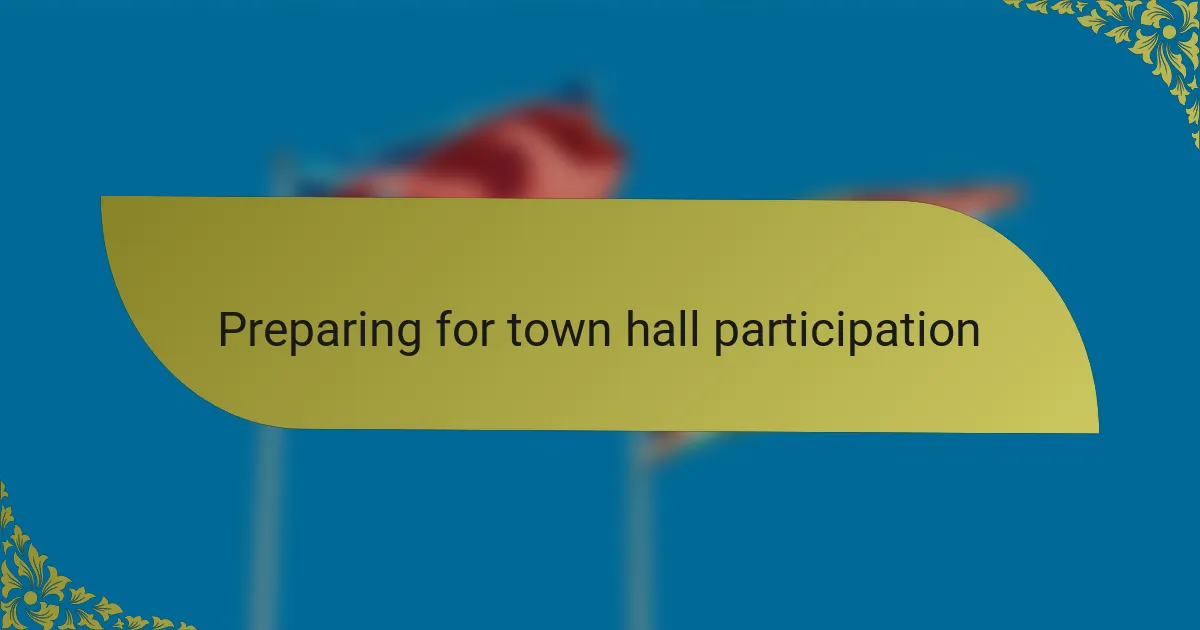
Preparing for town hall participation
Participating in town hall meetings can be an eye-opening experience, but preparation is key. I remember my first meeting; I felt both excited and anxious sitting among community members, eager to voice my concerns. Researching the topics on the agenda helped me feel more confident and allowed me to engage meaningfully with local issues.
To effectively prepare for town hall participation, consider these steps:
- Review the agenda: Familiarize yourself with the topics that will be discussed.
- Research the issues: Understand the background of each issue; this can provide you with valuable context.
- Outline your questions: Jot down key points or questions you want to address during the meeting.
- Know the speakers: Understanding who will be present, such as local officials or community leaders, can help tailor your discussions.
- Bring materials: Having a notebook or digital device can help you take notes and stay organized during the meeting.
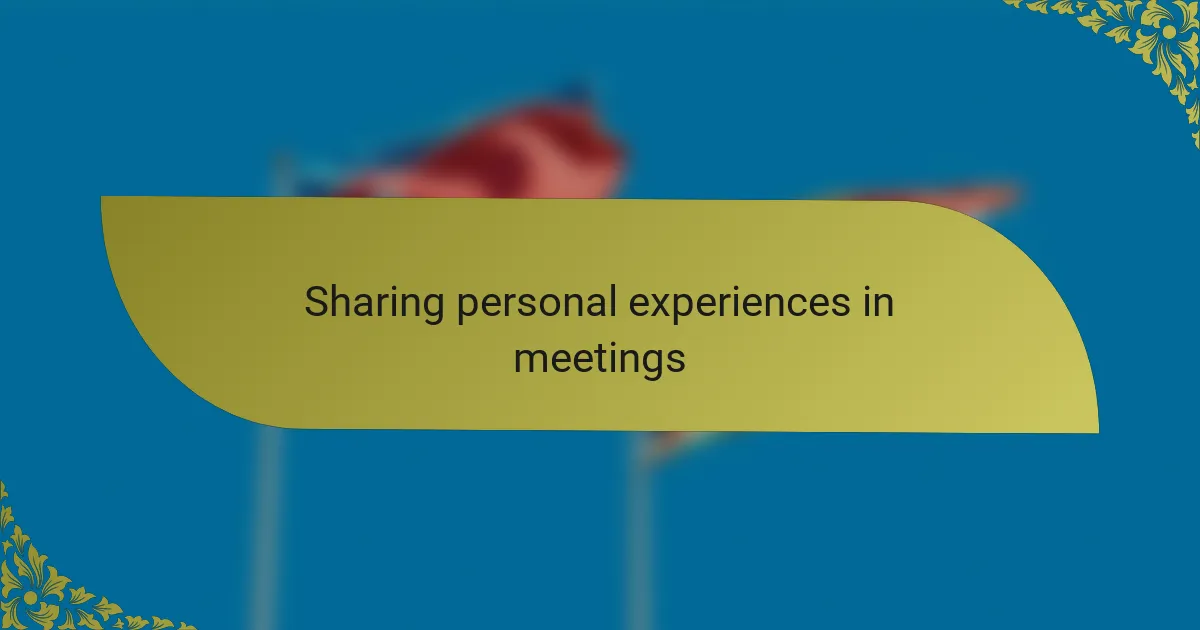
Sharing personal experiences in meetings
Sharing personal experiences in meetings can honestly shift the atmosphere. I remember one particular town hall meeting where community members passionately voiced their concerns about local school funding. Their stories touched on deep emotions—like the anxiety of parents wanting the best for their children’s futures. It showcased how personal narratives can emphasize the importance of political discussions.
I’ve noticed when participants share their firsthand experiences, it invites a more profound connection among attendees. For example, during another meeting, a woman spoke about her struggles with healthcare access. Her vulnerability prompted others to speak up too, creating a supportive environment.
Here’s a comparison table showcasing the impact of personal storytelling versus statistics during these meetings:
| Aspect | Personal Storytelling | Statistics |
|---|---|---|
| Emotional Engagement | High | Low |
| Connection Among Participants | Strong | Weak |
| Clarity of Issues | Contextual | Data-Driven |
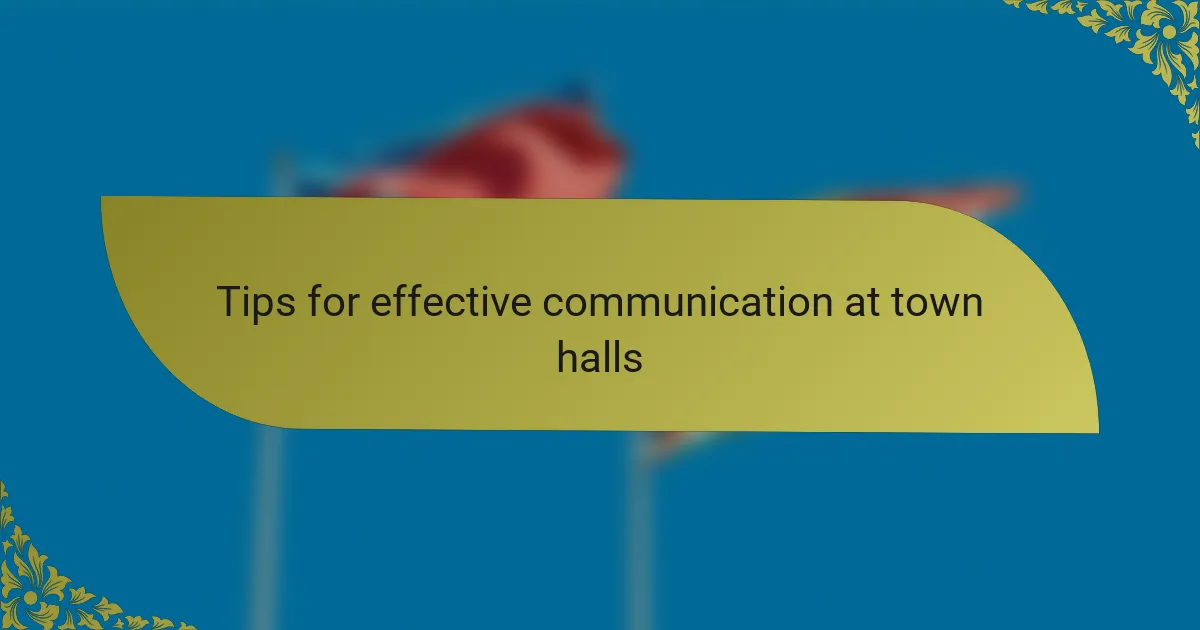
Tips for effective communication at town halls
Effective communication at town halls begins with clarity. When I’ve spoken up at these meetings, I’ve realized that being concise helps keep the audience’s attention. For instance, I try to express my thoughts in just a few sentences, focusing on what truly matters. Have you ever noticed how a well-structured point resonates more than a lengthy monologue? It’s something I’ve learned over time.
Listening actively is equally important. During one town hall, I saw how participants visibly engaged when responding to one another. Sharing a moment of silence after someone speaks can enhance understanding. It shows respect for their perspective. As I’ve experienced, acknowledging others’ viewpoints can lead to a more productive dialogue and foster a sense of community.
Finally, don’t shy away from asking questions. I’ve found that posing a thoughtful question not only clarifies my understanding but also encourages others to join the conversation. For instance, after a discussion about community safety, I asked how we could work together on initiatives. That single question sparked a lively exchange of ideas, showcasing the power of curiosity in these settings.